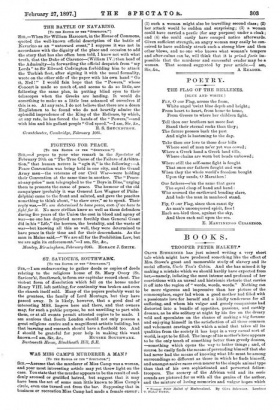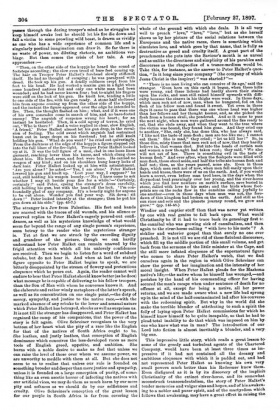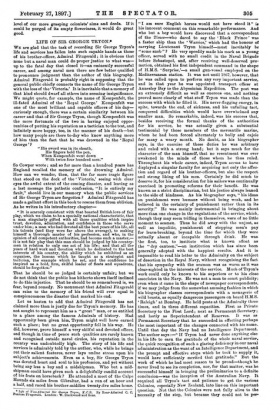BOOKS.
TROOPER PETER HALKET.*
OLIVE SCHREINER has just missed writing a very short tale which might have produced something like the effect of Mrs. Stowe's great and memorable study of slavery and its social effects, Uncle Tom's Cabin. And she has missed it by making a mistake which we should hardly have expected from her,—namely, inflating the most intense and profound of her convictions with an unreal and histrionic rhetoric that carries it off into the region of " words, words, words." Nothing can be more vigorous and impressive than her picture of the commonplace, eager lad whom a good mother had filled with a passionate love for herself and a kindly tenderness for all suffering, and whom his vulgar and greedy companions had distorted into a bundle of appetites, passions, and earthly dreams, as he sits solitary at night by his fire on the dreary veld and speculates on the chance of making a big fortune and enjoying himself in the satisfaction of all those common and vehement cravings with which a mind that takes all its qualities from the society it has kept in a very carnal sort of world, is apt to be filled. The image of his mother's love appears to be the only touch of something better than greedy desires, —something which opens the way to better things ; and, of course, he easily finds the means of persuading himself that she had never had the means of knowing what life must be among surroundings so different as those in which be finds himself, and amongst native races even nearer to the simple animal type than that of his own sophisticated and perverted fellow- troopers. The scenery of the African veld and its eerie sounds are pictured for us with all the genius of the author, and the mixture of loving memories and vulgar hopes which • Trooper Peter Hailed of Mashonaland. By Oliva Schreiner. Londons T. Maher Unwin.
passes through the dozing trooper's mind as he struggles to keep himself awake lest he should let his fire die down and fall a victim to some prowling wild beast, is drawn as vividly as one who has a wide experience of common life and a singularly poetical imagination can draw it. So far there is no waste of power, no diluting rhetoric, no ambitious ver- biage. But then comes the crisis of her tale. A step approaches :—
" Then, on the other side of the koppje he heard the sound of footsteps ascending; the slow even tread of bare feet coming up. The hair on Trooper Peter Halket's forehead slowly stiffened itself. He had no thought of escaping ; he was paralyzed with dread. He took up his gun. A deadly coldness crept from his feet to his bead. He had worked a maxim gun in a fight when some hundred natives fell and only one white man had been wounded ; and he had never known fear ; but to-night his fingers were stiff on the lock of his gun. He knelt low, tending a little to one side of the fire, with his gun ready. A stone half sheltered him from anyone coming up from the other side of the koppje, and the instant the figure appeared over the edge he intended to fire. Then, the thought flashed on him ; what, and if it were one of his own comrades come in search of him, and no bare-footed enemy ! The anguish of suspense wrung his heart ; for an instant he hesitated. Then, in a cold agony of terror, he cried out, Who is there ?' And a voice replied in clear, slow English, ' A friend.' Peter Halket almost let his gun drop, in the revul- sion of feeling. The cold sweat which anguish had restrained burst out in large drops on his forehead; but he still knelt holding his gun. What do you want ? ' he cried out quiveringly. From the darkness at the edge of the koppje a figure stepped out into the full blaze of the fire-light. Trooper Peter Halket looked up at it. It was the tall figure of a man, clad in one loose linen garment, reaching lower than his knees, and which clung close about him. His head, arms, and feet were bare. He carried no weapon of any kind ; and on his shoulders hung heavy locks of dark hair. Peter Halket looked up at him with astonishment. Are you alone ? ' he asked.—'Yes, I am alone' Peter Halket lowered his gun and knelt up. 'Lost your way, I suppose ? ' he said, still holding his weapon loosely.—' No ; I have come to ask whether I may sit beside your fire for a while.'—' Certainly, certainly !' said Peter, eyeing the stranger's dress carefully, still holding his gun, but with the hand off the lock. I'm con- foundedly glad of any company. It's a beastly night for anyone to be out alone. Wonder you find your way. Sit down ! sit down ! ' Peter looked intently at the stranger; then he put his gun down at his side." (pp. 43-7.)
The stranger is a Jew from Palestine. His feet and bands are scarred with the traces of old wounds, and his silence or reserved replies to Peter Halket's eagerly poured-out confi- dences, as well as his mysterious knowledge of what would seem far beyond the range of any single person's experience, soon betray to the reader who the mysterious stranger is. Yet at first we are struck by the exceeding dignity and grandeur of the picture, though we can hardly understand how Peter Halket can remain unawed by the frigid attention with which all his unlovely confidences are received. Then we begin to listen for a word of subdued rebuke, but do not hear it. And when at last the stately figure opposite to Peter Halket begins to speak, we are bitterly disappointed by the stream of flowery and pretentious eloquence which he pours out. Again, the reader cannot well endure to hear that Peter Halket should know better (as he does) what message he is capable of delivering to his fellow troopers, than the Son of Man with whom he converses knows it. And the elaborate and rather windy metaphors of the latter's speech, as well as its concentration on one single point,—the duty of mercy, sympathy, and justice to the native race,—with the marked absence of any rebuke to the lower and sensual nature which Peter Halket has betrayed, shocks as well as surprises us. It is not till the stranger has disappeared, and Peter Halket has regained the camp of his companions, that the power of the story is felt again. Olive Schreiner recognises to the very bottom of her heart what the pity of a race like the English for that of the natives of South Africa ought to be.
She loathes, and justly loathes, that conception of English dominance which conceives the less-developed races as mere tools of English greed, appetite, and ambition. She barns with a noble desire to make us feel that unless we can raise the level of those over whom we assume power, we are unworthy to meddle with them at all. But she does not seem to us to realise that unless our rule is founded on something broader and deeper than mere justice and sympathy, unless it is founded on a large conception of purity, of some- thing like an even ascetic horror of infecting the natives with our artificial vices, we may do them as much harm by our mere
pity and softness as we should do by our selfishness and cruelty. Olive Schreiner's conception of the great lesson for our people in South Africa is far from covering the
whole of the ground with which she deals. It is all very well to preach "love," "love," "love," but as she herself shows us by her picture of the social relations between the Europeans and the native races, there is something which simulates love, and which goes by that name, that is fully as destructive as greed and cruelty itself. A great part of the preachments she puts into the Saviour's mouth is as unreal and as unlike the directness and simplicity of his parables and discourses as the rhapsodies of a trance-medium would be.
Take this, for instance, as the answer to Peter Halket's ques- tion, " Is it long since your company " (the company of which Jesus Christ is the inspirer) "was started ? "— " There is no man living who can conceive of its age,' said the stranger. 'Even here on this earth it began, when these hills were young, and these lichens had hardly shown their stains. upon the rocks, and man still raised himself upwards with diffi- culty because the sinews in his thighs were weak. In those days, , which men reek not of now, man, when he hungered, fed on the flesh of his fellow man and found it sweet. Yet even in those days it came to pass that there was one whose head was higher than her fellows and her thought keener, and, as she picked the flesh from a human skull, she pondered. And so it came to pass the next night, when men were gathered around the fire ready to eat, that she stole away, and when they went to the tree where the victim was bound, they found him gone. And they cried one to another, " She, only she, has done this, who has always said, ' I like not the taste of man-flesh ; men are too like me ; I cannot eat them.' She is mad," they cried ; " let us kill her !" So, in those dim, misty times that men reek not of now, that they hardly believe in, that woman died. But into the heads of certain men and women a new thought had taken root; they said, " We also will not eat of her. There is something evil in the taste of human flesh." And ever after, when the fleshpots were filled with man-flesh, these stood aside, and half the tribe ate human flesh and half not; then, as the years passed, none ate. Even in those days, which men reck not of now, when men fell easily upon their hands and knees, there were of us on the earth. And, if you would learn a secret, even before man trod here, in the days when the dicynodont bent yearningly over her young, and the river-horsa which you find now nowhere on earth's surface, save buried in stone, called with love to his mate; and the birds whose foot- prints are on the rocks flew in the sunshine calling joyfully to one another—even in those days when man was not, the fore- dawn of this kingdom had broken on the earth. And still as the sun rises and sets and the planets journey round, we grow and grow.'" (pp. 145-48.)
Windier and emptier stuff than that was never yet written by one with real genius to fall back upon. What would' Christianity be if it had to trace back its genealogy first tc the cannibal who was growing sick of cannibalism, and then again to the river-horse calling "with love to his mate "P A sicklier and waterier gospel than that surely no one ever preached. It is not till we are rid of these flatulent discourses, which fill up the middle portion of this small volume, and get back from the sermons of the little minister at the Cape, and the still more inflated eloquence of the supernatural figure who comes to share Peter Halket's watch, that we find ourselves again in the region in which Olive Schreiner can show the power of her imagination and the intensity of her moral insight. When Peter Halket pleads for the Mashona native's life,—the native whom he himself has wronged,—and perishes by the hand of his commanding officer for having secured the man's escape when under sentence of death for no offence at all, except for being a native, all her power returns, and we are made aware what a new life had sprung up in the mind of the half-contaminated lad after his converse/ with the redeeming spirit. But why in the world did she make the terrible blunder of attributing to such a spirit the. folly of laying upon Peter Halket commissions for which he himself knew himself to be quite incapable, so that he had to. plead total inability to do that which was imposed on him by.
one who knew what was in man? The introduction of our Lord into fiction is almost inevitably a blunder, and a very- big one.
This impressive little story, which reads a great lesson to some of the greedy and turbulent agents of the Chartered Company, would have been at least three times as im- pressive if it had not contained all the dreamy and ambitious eloquence with which it is padded out, and had not represented Peter Halket as knowing his own very small powers much better than his Redeemer knew them.
Even disfigured as it is by its discovery of the implicit Christianity of the extinct river-horse, and its somewhat moonstruck transcendentalism, the story of Peter Halket's tender memories and vulgar sins and hopes, and of his awaken- ing to a nobler and purer spirit, and of the martyrdom which follows that awakening, may have a great effect in raising the level of our more grasping colonists' aims and deeds. If it could be purged of its empty floweriness, it would do great good.




































 Previous page
Previous page